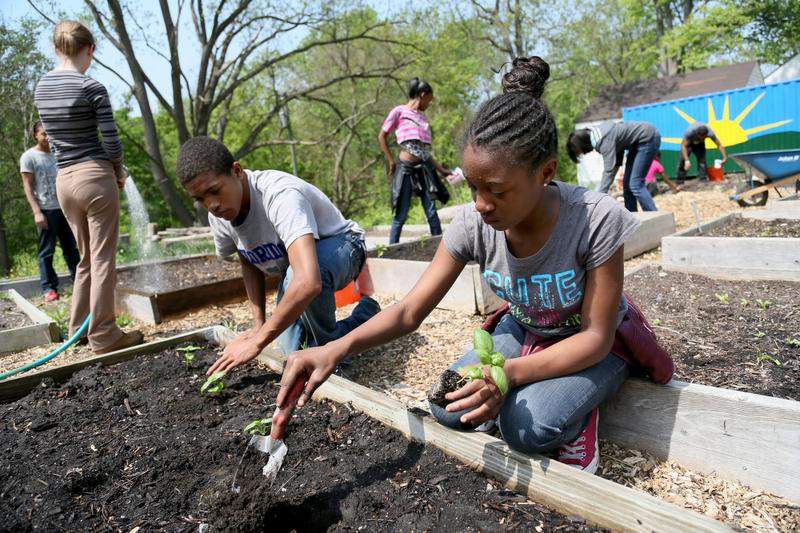
What’s not so simple, however, is the business of food itself. As in the business of food manufacturing businesses, food regulation, food delivery services, farms that produce and grow food, food in grocery stores, food in gas stations, food at high-end restaurants and food at Church’s Chicken.
But that’s just for starters, because the real issue that affects most of you reading this article is food access. Which basically means which populations right here in Detroit have real access to healthy food? Not McDonald’s or whatever you can grab from the nearest gas station, but actual food that will nourish your body and give your body what it needs. And for those families who don’t have easy access to good food choices, how can that situation be rectified? And what are the consequences to community if that situation is not rectified? And how does institutional and systemic racism factor in to who does and does not have access to healthy food?
From the Detroit Food Policy Council’s “Creating a Food secure Detroit” 2017 policy review and update:
“Detroit’s food sector generates $3.2 billion in revenue each year and supports 36,000 jobs, but more than half the revenue leaks to companies outside Detroit. Although Detroit’s population is over 82 percent African American, there are only a handful of African American-owned food businesses. African Americans in Detroit’s food system predominantly occupy low-wage positions or simply play the role of consumer.”
It was these sorts of issues that were dealt with head-on recently at the two-day Detroit Food 2017 conference, sponsored by the Detroit Food Policy Council. But it is precisely these issues that need to be dealt with and highlighted on a consistent and ongoing basis as Detroit continues its uneven journey toward what we all hope will be a better future. Because the present condition of the city still needs a lot of work once you get outside of downtown.
“Federally subsidized nutrition programs support emergency food providers, fund school nutrition and supplement individual food purchasing power. To qualify for the Supplemental Nutrition Assistance Program (SNAP, Food Stamps), individulas must be at or below 130% of the poverty line. From the period 2010 – 2015, poverty in Detroit climbed from 34.5 % (47.7% for children under 18) to 39.8% (55.2% for children under 18), and as a result, nearly half ( 47%) of Detroit is eligible for SNAP benefits. Based on average SNAP participation rates in Michigan, this represents over $2 billion public dollars available to be spent on food.”
So one thing is for certain; if the improvement of Detroit’s food situation is not considered a critical factor in the city’s rebuilding, then a better future is much further away than we’d like for it to be. A major part of rebuilding Detroit’s neighborhoods has to be improving access to better food choices for the families in those neighborhoods. Because the consequences of a consistently poor diet can be severe.
“Fast food is scientifically designed to be delicious, and to be enjoyable, and to hit some very specific centers of enjoyment in the structure of your brain and in your body’s chemistry. The right mixture of salt, fat and sugar is delicious no matter what. Because we’re hard-wired to enjoy it,” said Aaron Egan, a food historian, writer and chef who served as one of the panelists on Friday’s discussion entitled Food in the Current Political Climate. “I cook food, and that’s a very interesting lens to look at the rest of the world through. We use the phrase ‘a seat at the table’ in politics a lot, in discussing how we want to include or how we do not currently include people in any number of important discussions. And I think that’s really an interesting quirk of our language that we ultimately understand food as something very central and something that allows us to explore so many other different things. ..It’s obviously a powerful point of intersection for so many different things.”
And from the Food Policy Council report:
“Processed foods command much of the shelf space in Detroit food stores, while healthy, minimally processed food is much less readily available. The effects are severe: Wayne County has remained the least healthy county in Michigan since county health rankings began in 2010. Estimates for obesity in Detroit range between 33 % and 38 % and are trending upward. For 1 in 3 Detroiters this means a higher risk of chronic illness and much reduced quality of life.”
For Will Copeland, an environmental justice advocate who also served on the panel discussion with Egan, environment has a lot to do with quality of life. The problem, as he sees it, is that not enough Detroiters seem to realize just how important concern for the environment really is, or why it should matter to black folks.
“When many people think about the environment, they think about polar bears, or rain forests, or saving the whales, or something like that. We always ask the question, ‘what’s in your environment?’ And who is in our environment? Who do we see at the gas stations, or at the Church’s Chicken? All the different liquor stores and whatnot are in our environment. And so we’re trying to bring justice to our environment. …I’ve been in a couple conversations recently where people said – these are Detroit people – said that the environment is a concern for white people. If you do something environmental, only white people are gonna come to it, or only white people that care about it. I’m talking about Detroiters saying these things, and I get why they’re saying that, but I think that it’s our job to reframe it and say that what we’re doing is environmental. We’re not gonna let somebody else define what is saving the environment or protecting the environment.”
